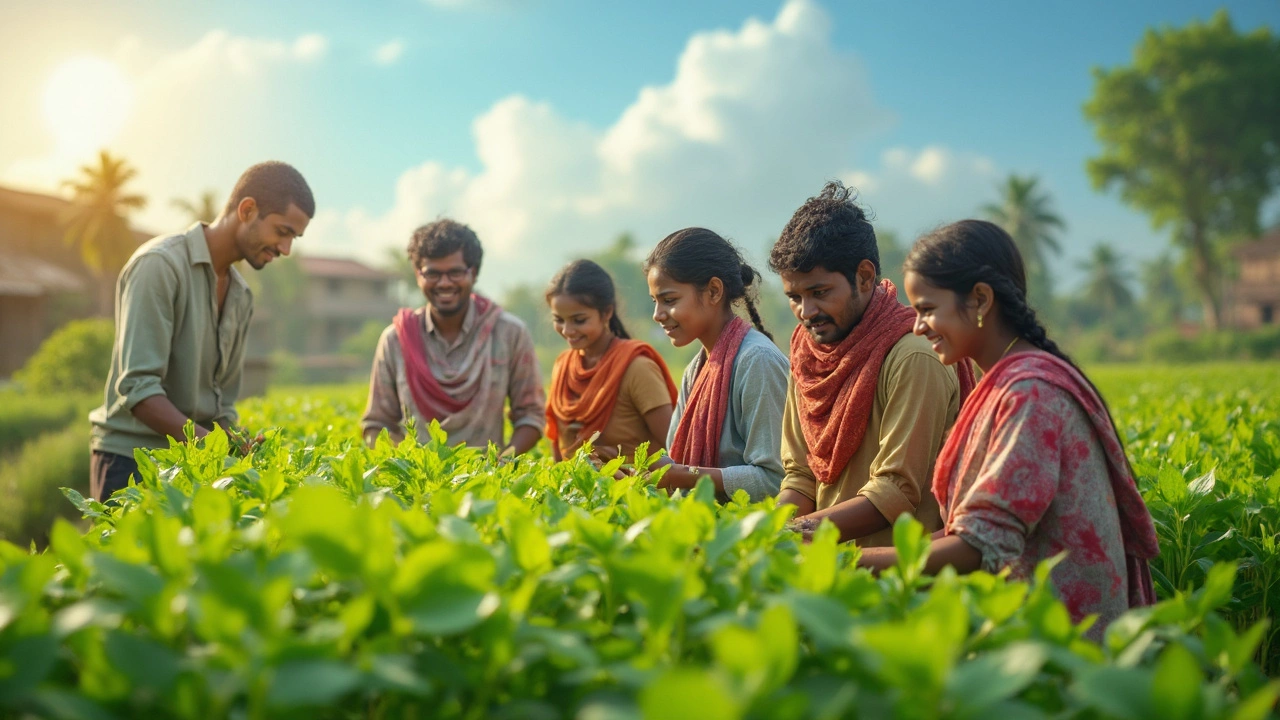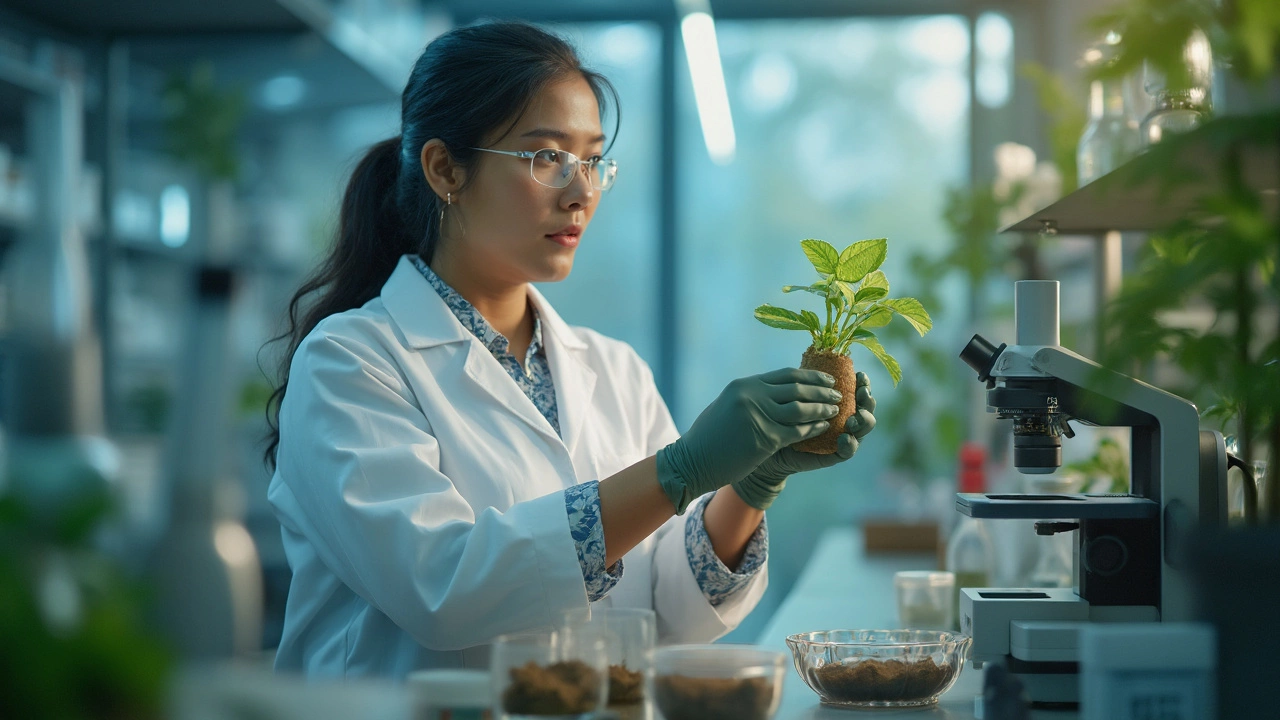Easiest Science Degree: Why Agricultural Science Might Be Your Best Bet
 Apr, 1 2025
Apr, 1 2025
Picture this: a science degree that's not only manageable but also opens doors to meaningful careers. If you're scratching your head wondering which one fits that bill, let me introduce you to Agricultural Science. It often flies under the radar, but it's a hidden gem for those aiming for an approachable yet rewarding academic path.
This degree combines elements of biology, environmental science, and hands-on agricultural work, making it far less intimidating than your classic physics or chemistry courses. Unlike the heavy theory-focused counterparts, this field allows you to get your hands dirty—quite literally. Imagine learning about crop management while actually visiting farms or exploring sustainable agriculture methods with hands-on projects. Sounds more engaging, right?
Many students find this combo of practical experience and classroom learning a perfect mix, especially if you aren't thrilled about spending all your time buried under textbooks. Plus, with the growing focus on sustainability and food security these days, graduates have access to a wide array of career paths—from local farming roles to global environmental initiatives.
- Agriculture Science: The Basics
- Why It's Considered Easy
- Career Opportunities Await
- Real-world Applications
- Tips for Success in Agricultural Science
Agriculture Science: The Basics
Diving into Agricultural Science offers more than just a glimpse into farming. It's a field that blends biological sciences with practical knowledge to tackle real-world issues. At its core, this discipline focuses on improving the efficiency and sustainability of global food production.
You might wonder what exactly you study in an agricultural science degree. Let's break it down:
- Soil Science: Understanding soil properties and their role in growing crops.
- Crop Production: Learning techniques to increase yield and ensure healthy plants.
- Animal Husbandry: Managing the breeding and care of farm animals.
- Environmental Sustainability: Developing practices that protect natural resources while boosting production.
But it's not just about what's in the textbooks. Many programs offer hands-on training through farm visits or internships, which is possibly why this field seems more approachable to a lot of students. You'll actually see and experience what you're learning, making those concepts easier to grasp.
And here's a fun fact: as of 2024, about 22 million people in the U.S. were employed in agriculture-related jobs, showing how vital this sector is. With an increasing global population and climate change affecting food security, the importance of knowledgeable agricultural professionals is only growing.
So, if you're looking for a degree that's both easier to manage and packed with opportunities to make a difference, agriculture studies are definitely worth considering.
Why It's Considered Easy
If you're after a science degree that's more approachable, look no further than agricultural science. So, why is it labeled as the 'easiest science degree'? It's all about how the curriculum is crafted and what it emphasizes.
For starters, this field often steers clear of the intense mathematics and abstract theories that dance around in majors like physics or chemistry. Instead, it welcomes students with a mix of theory and real-world applications. Expect more fieldwork and less time stuck inside a lab grappling with tricky equations. Sounds less daunting, right?
A lot of what you'll learn is tied to practical, hands-on experiences. Many universities offer opportunities to engage in farming projects, which makes grasping concepts a lot easier than trying to digest complex theories from textbooks. Plus, who doesn't like the idea of getting outside and learning in the fresh air?
Another cool thing is that this degree often includes interdisciplinary studies, pulling in bits from business, technology, and environmental science. This broader scope can make the subject matter more relatable and easier to follow.
- Farming simulations and crop management projects provide on-the-ground learning.
- Less intensive math and chemistry requirements compared to traditional sciences.
- Opportunities for internships and co-op programs enhance practical understanding.
Sure, it's not a breeze, but compared to its rigorous counterparts, agriculture studies provide a more balanced academic journey. Whether you're tackling sustainable farming or bio-based pest control, the variety means there's something for everyone, keeping your interest alive and stress levels low.

Career Opportunities Await
Alright, so getting a degree in Agricultural Science isn't just about becoming a farmer (though that's a noble path too!). It opens up a ton of doors that you might not have considered. With food security and sustainable practices being huge buzzwords right now, your degree can take you places.
Think about working closely with government agencies like the USDA or becoming part of agricultural consultancy firms where you can influence policy and practice. You could also dive into research, focusing on sustainable farming techniques or genetically modified crops, playing a part in feeding the future.
Private companies are on the lookout for experts who can improve crop yields or develop more eco-friendly pesticides. If you're into technology, AgTech is booming with opportunities. Imagine combining drones and AI for precision farming—it's like being on the frontier of the next agricultural revolution!
- Local and International NGOs: Work on projects aimed at alleviating food scarcity and boosting sustainable practices globally.
- Extension Services: Educate farmers with latest techniques and research findings.
- Environmental Conservation: Help balance agriculture with conservation of nature.
- Food Quality Assurance: Ensure food safety from the field to the plate.
Even teaching is an option. Pass on your knowledge and inspire the next generation of agricultural scientists in schools or universities. And if you've got an entrepreneurial kick, why not start your own sustainable farm or AgTech startup?
Here's a glimpse at the potential job market:
| Role | Estimated Salary (USD) |
|---|---|
| Agricultural Consultant | 60,000 - 100,000 |
| Sustainable Agriculture Specialist | 55,000 - 90,000 |
| AgTech Developer | 70,000 - 120,000 |
Long story short, with an agricultural science degree, you're not just locking yourself into one path. You've got options across industries, roles that can make a real impact on our planet and society. Now doesn't that sound worthwhile?
Real-world Applications
The beauty of an agricultural science degree is how it comes to life outside the classroom. It's not just about learning theories; it's about experiencing them in action. When it comes to agricultural science, you're diving into a field that's all about sustainability and feeding the future, which is crucial in today's world.
So, what do these real-world applications look like? Let's start with something as tangible as farms. As an agricultural scientist, you might work hands-on with farmers to develop more efficient growing techniques. This could mean introducing new crop rotations or sustainable pest management practices, directly impacting food production efficiency and environmental health.
We can't forget about technology either. Advances in farming tech, like drones and AI, are becoming a staple in the field. They're used to monitor crop health, soil conditions, and even to predict weather patterns. If you're someone who's into tech and farming, this fusion might be your playground.
The degree is also a gateway into the world of food security. With global populations rising, ensuring everybody gets enough food is becoming more critical. Graduates might find themselves working with NGOs or government programs to improve food distribution systems or work on groundbreaking research to develop drought-resistant crops.
If you enjoy a mix of travel and work, international roles in agricultural science aren't uncommon. Working on international development projects could mean helping countries implement sustainable farming methods or tackle food scarcity issues, all while exploring new cultures.

Tips for Success in Agricultural Science
Diving into an agricultural science degree is exciting, but let's keep it real—it helps to come in with a game plan. Want to make the most of your studies and emerge as a future farming expert? Check out these handy tips.
- Get Hands-On: Embrace opportunities for fieldwork. Whether it’s through school programs or volunteering, any chance to work directly on a farm or in a greenhouse will solidify what you learn in class.
- Stay Updated: Agriculture is an evolving field, thanks to tech advancements and new sustainability practices. Subscribe to journals, follow relevant blogs, and join online forums to stay in the loop.
- Network Like a Pro: Connect with professors and industry professionals. Building relationships now can lead to internships, job offers, or research opportunities later.
- Join Clubs: Many schools have agriculture-related clubs or societies. These groups not only provide learning experiences but also a sense of community and potentially lifelong friendships.
- Understand the Basics: Brush up on essential science topics like biology and environmental science, so you’re ready to tackle any coursework that comes your way.
And here’s a little bonus nugget: Did you know that the World Bank reports agriculture accounts for about 4% of global GDP? That stat alone should remind you of the field’s impact and why your study matters!
By integrating these strategies, you'll not only glide through your coursework but also set yourself up for a fulfilling career in agriculture.